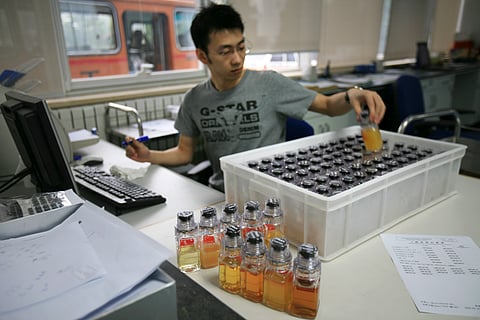

KOCHI: Arjun, the Delhi-born discus thrower, who had won silver in the 2010 Youth Olympics, has been tested positive for anabolic steroid for a sample taken during the Indian Grand Prix in April 2016. Doping is not a new scenario in Indian athletics as athletes from the country constitute the most number of dope offenders.
However, Arjun’s case is alarmingly different from others. The 24-year-old’s samples were first declared negative in the tests conducted by the National Dope Testing Laboratory (NDTL). However, when the same sample was sent to the Institute of Biochemistry — German Sport University, Cologne for further probe as per instructions of international athletics body (IAAF), it yielded a positive result.
As per sources, the Isotope Ratio Mass Spectrometry (IRMS) test was performed outside India on the insistence of the IAAF after the newly-formed athletics integrity unit of the world body received intelligence about the athlete resorting to doping practises. NDTL sources also confirmed that Arjun’s samples were sent to the Cologne lab as per IAAF’s instruction and that reports of the test was received by October.
Arjun verified this and added that the NDTL officials had withheld the results for almost two months and passed it on to him by December. Arjun has been on a provisional ban from December 2 onwards. “The NDTL’s test gave a negative report. Later they sent the samples abroad without my consent and when the results came, they delayed informing me,” Arjun said. A member of the national camps conducted by the Athletics Federation of India (AFI) for the last four years, Arjun argued that he was being falsely implicated in the dope scandal.
“I am innocent. I have never done doping,” he said. “They didn’t seek my consent. When I asked why they sent my samples for testing in a foreign lab, they didn’t give me an answer,” he added. An anti-doping expert who is familiar with the case said NDTL has done nothing wrong. “As per WADA rules, if IAAF is suspicious about an athlete they can get his samples tested in a foreign lab accredited by WADA.” The NDTL in Delhi is a WADA-accredited lab and the decision of IAAF to do the re-check abroad raises a few questions regarding credibility of the Indian lab.
“The same procedure, the IRMS test, can be done in the Delhi lab. They’ve got the facility to do that. The athlete in question is not a renowned one. So, if IAAF opted to get the sample tested outside India, it’s not a good sign. We can doubt whether they suspect the credibility of our lab,” a former NADA official told Express. “All I know is that Arjun has been tested positive. I don’t have any information regarding the other things,” said AFI president Adille Sumariwalla. Despite repeated attempts, NDTL officials were unavailable for comment.
shan.as@newindianexpress.com